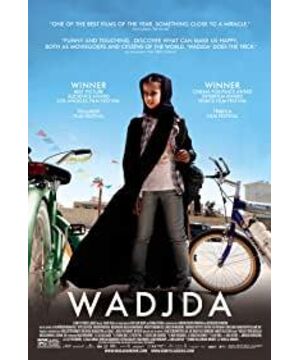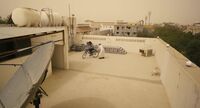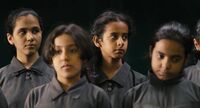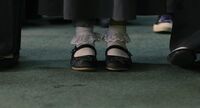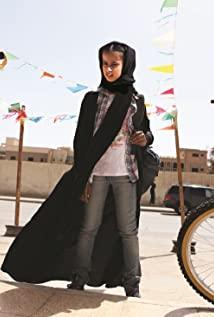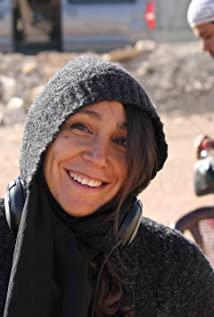【one】
In the past, the Middle East movies were basically seen in Iran, so I had a good impression of Iranian movies. But several other countries don't seem to have the ability to produce movies, and so far they haven't seen any good Middle Eastern movies except Iran.
In addition, I know very little about Saudi Arabia: absolute monarchy, rich royal family, oil power, desert oasis, war in the Middle East, halal power, strictness on women, broadcasting sports games and playing mosaic... Because of these, unconsciously It automatically blocks the fact that the country is "one of the richest countries in the world" because of oil.
When I saw that they also made a film and also won awards at the Venice Film Festival, I couldn't help but see what the film was about and how it was different compared to Iranian films.
After reading it, I feel very good, clean and warm. The shooting mode, atmosphere and performance of this film are similar to those of Iranian films. Maybe most of the famous Iranian films before are related to children + poverty, so when watching "Wajda", at the beginning, when Wajda saved money for bicycles , the first reaction was that their family "couldn't afford to buy a bicycle", but when I saw the back, I suddenly realized that it was because women were not allowed to ride a bicycle.
Primary school textbooks have always included a book like "Society". It is a marginal textbook. Teachers will not teach it seriously, and students will naturally not read it seriously, but it is strange that Miss Huang likes this book the most. Read every grade and every school year carefully. What impressed me was that there was a chapter introducing different foreign cultures, saying that women in Egypt could ride motorcycles in recent years, but they had to wear black veils on their faces.
At that time, there was no concept of religion, and the vague impression of Egypt was nothing but primitive religions such as the Pharaoh's pyramids. I didn't know that there would be such an Islam with extremely strict requirements on women in the world, and I didn't know that Egypt existed as early as China in China. It has been greened since the Tang Dynasty, so when I see this point specially emphasized in the book, I feel very incomprehensible and confused.
What's wrong with riding a bike? I'm eating your rice.
Later, a relative put a bicycle in our house, and it was not claimed for a long time. We took turns riding out, stumbled and learned to manage it smoothly across the street. And we're in a very remote town in the southwest - so at least in my opinion, you can't ride a bike in China only because you can't afford it, not because you're a woman.
【two】
Riyadh in the movie looks clean, neat and beautiful. Wajda's house has a courtyard, a gorgeous carpet, a big video game console, and both parents have jobs. Nothing to do.
Waganda is a 12-year-old girl, smart, beautiful, determined, courageous and resourceful.
She doesn't want to follow the rigid school rules, she insists on wearing canvas shoes that the teacher doesn't like, wearing jeans when listening to rock music, and wearing black gauze without covering her face. If something is robbed by a boy, she will rob it back. When she sees a boy riding a bicycle, she I saved money to buy it, even though the principal and my mother had emphasized that women were not allowed to ride bicycles, they still went to school secretly, lost their minds while listening to the Quran, and passed small notes to a classmate (the classmate then eloped with the man)… these Although things in the Arab world, in Riyadh, and in the environment where Wagada lives are not subject to criminal law, they are always disliked by the elders, so Waganda was labeled by the teacher as a deviant. Fortunately, Waganda found out The prize money for the first place in the Quran quiz can buy a bicycle, and it took some time after signing up for the competition, which did not give the headmistress a chance to express her dissatisfaction with her.
Waganda's parents love her very much, but her father is often absent, and her mother is often absent-minded in order to please her father. The two adults seem to be in love with each other, but there is some kind of estrangement.
Because the mother failed to give birth to a son, Waganda's grandmother kept arguing to find another daughter-in-law for her father. The father neither admitted nor denied it. The mother pretended not to care about privately, but went to the store with Waganda to pick out beautiful clothes and wanted to make a difference. This adds to his charm, does his housework seriously, and takes care of his father and his friends, trying to keep his father.
The headmistress targeted Waganda in various ways, but her attitude softened after seeing that Waganda was interested in the Koran; the school rumored that she let her lover pretend to be a thief and sneak into the house, but she read magazines to the two (as if they were fighting) They also put their hands into each other's skirts and touched each other's legs or something) The whole school reported that they had done something shameful; when Waganda won the first place and wanted to get a bonus to buy a bicycle, she quickly recovered. The appearance of human affection privately donated Wajda's prize money to Palestine.
There are very few scenes of Arab men in the film, and almost all of them describe women. Waganda's mother, mother's friends, Waganda, Waganda's classmates, and teachers are all women, and most of them follow The rules of the Arab world do not dare to violate the rules, and other women are also restricted from doing so. Neither need a male presence to keep their world running.
But Waganda is one of the bright colors.
Her restlessness is unconventional and candid and generous.
She dared to dress according to the style she liked, dare to go to the store and tell the boss to keep a bicycle for her, dare to grab her turban from Abdullah, and dare to play and talk with Abdullah alone on the rooftop, Dare to put his name on the family tree, dare to say out loud that he wants to buy a bicycle after winning the first place, and finally dare to ride a bicycle through the streets of Riyadh.
Among them, the female classmate who eloped with someone who claimed to be her cousin but was actually her boyfriend, the headmistress who made her lover pretend to be a thief to meet secretly, the mother's friend who felt uncomfortable with the driver and had to work in another place, wanted to be free and easy but it was difficult Mothers who let go... They all want to break the canons and traditions more or less, but they only dare to quietly, privately, and cautiously hover on the edge, and dare not stand on the bright side like Waganda.
So many people don't like something, but they dare not challenge it to break it, so they are bound and imprisoned all the time.
In contrast, Waganda, the brave little girl, is particularly moving.
She is cheerful and lively and has her own ideas and wants to live the life she likes, but she can fight gently, cautiously, calmly and generously.
Worldly and aloof, quite cute.
Another good point is that the film describes the protests with a touch of restraint from beginning to end, and because of this, we can better feel the truth of Saudi Arabia and ordinary people in Riyadh in this line-like narrative structure. beauty of.
The more plain it is, the more moving it is, the more straightforward it is, the more real it is.
【three】
Last but not least is Islam.
It is undeniable that since the founding of Islam, it has made great contributions to world civilization, unifying the Arab world, building temples and schools to spread knowledge and culture, as a hub for exchanges between the East and the West, breaking the inherent cognition on both sides, and expanding the territory. The exchanges of civilizations around the world, the Wisdom Palace built, the century-old translation movement launched, and the powerful empire established are all extremely great.
For a religion to exist for thousands of years and develop into one of the three major religions in the world, there must be something special about it.
They value culture and belief, no matter how rich or poor they live. Many Iranian movies also touched the hearts of countless moviegoers because of such devotion. You have to say that such heartwarming stories can happen in every society, and the Middle East is no exception. But with Islamic filters, there are indeed nuances, and there is a unique flavor in it.
Therefore, Miss Huang has no doubts that there is a lot of beauty in the world under Islam, but it is undeniable that it is really not good for women's rights.
Marriage is decided by the parents that they can’t make decisions, they must wear black robes that only reveal their eyes, they are forbidden to have contact with men, they may be beaten to death if they are pregnant, they are not allowed to ride bicycles, they are not allowed to take pictures, they are not allowed to show their faces... Islam is a With the development of the times, a very vigorous religion, which is constantly eliminating the rough and saving the essence, not only does not make progress in women's rights, but also stands still or even regresses.
Not bad.
Such a film, which is basically meaningless in any non-Muslim region, has gained worldwide attention because it was born in an Arab country; we can be moved just by a little girl riding a bicycle.
We can't accept that world just because it's a good movie. I think the point of a movie is that you see the unreasonableness behind it through what it describes.
I only hope that the rights and interests of women will be further protected, and that there will be new development of equal rights between men and women. Therefore, I hope that there will be more Waganda in those places and the little Arab men who have always supported them.
View more about Wadjda reviews


